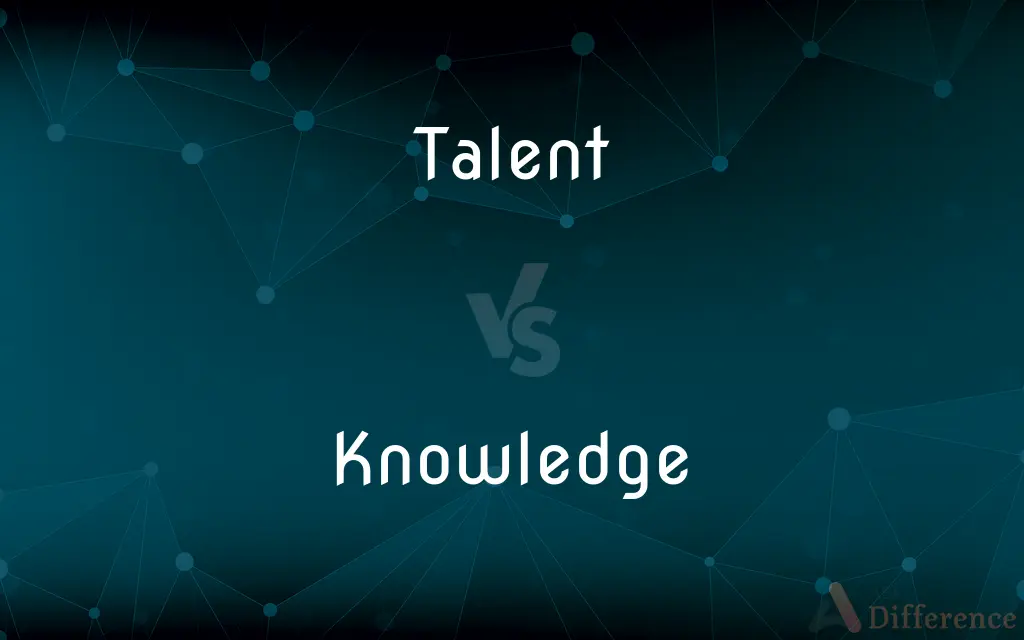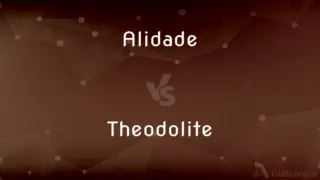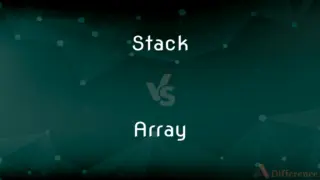Talent vs. Knowledge — What's the Difference?
By Maham Liaqat & Urooj Arif — Updated on March 29, 2024
Talent is a natural aptitude or skill, often innate, while knowledge is information, understanding, or skill acquired through experience or education.

Difference Between Talent and Knowledge
Table of Contents
ADVERTISEMENT
Key Differences
While talent provides a natural foundation for excellence in specific areas, allowing individuals to excel with seemingly less effort, knowledge is crucial for refining and directing that talent towards productive outcomes. For instance, a talented musician naturally understands and creates music in a way that resonates with listeners, whereas knowledge of music theory, history, and technique can enhance their creativity and proficiency.
The relationship between talent and knowledge is complementary. Talent without the enrichment of knowledge may reach a plateau, as innate ability alone cannot navigate the complexities and advancements within a field. Conversely, knowledge without the leverage of talent may result in proficiency but not necessarily the exceptional breakthroughs or innovations that can be achieved when both are combined.
Developing talent often involves recognizing and nurturing one's natural abilities, whereas acquiring knowledge requires deliberate effort in learning and education. The pursuit of knowledge can be a lifelong endeavor, encompassing formal education, personal reading, experiences, and professional development. It is dynamic, constantly expanding with new information and insights.
In practical terms, talent can give individuals a competitive edge in early stages or specific aspects of a career or activity. However, sustained success and mastery often depend on the depth and breadth of one’s knowledge. For example, in fields such as science, sports, or the arts, individuals who combine their innate talents with a rigorous acquisition of knowledge tend to achieve the highest levels of accomplishment and innovation.
Comparison Chart
Definition
Natural aptitude or skill, often innate.
Information, understanding acquired through experience or education.
ADVERTISEMENT
Acquisition
Innate and often evident from an early age.
Acquired through learning, experience, or education.
Role
Provides a foundation for excellence in specific areas.
Essential for informed decision-making and problem-solving.
Relationship
Can excel without much effort but needs knowledge to reach full potential.
Can enhance and direct talent towards productive outcomes.
Development
Involves recognizing and nurturing natural abilities.
Requires deliberate effort in learning and education.
Compare with Definitions
Talent
An inherent proficiency that requires minimal external training.
She has a talent for understanding complex musical compositions.
Knowledge
Information and skills acquired through experience or education.
His knowledge of history made him an excellent teacher.
Talent
A natural ability to excel in a particular activity.
Her talent for painting was evident even as a child.
Knowledge
A body of facts accumulated over time.
His knowledge of the market trends made him a successful investor.
Talent
A gift or natural endowment.
His talent for storytelling captivated every audience.
Knowledge
The theoretical or practical understanding of a subject.
Her knowledge in biochemistry led to a groundbreaking discovery.
Talent
Innate skill that sets individuals apart.
His mathematical talent won him several national competitions.
Knowledge
Information held about a particular subject.
His deep knowledge of classical music enriched his compositions.
Talent
The natural capacity to perform a task well.
Her talent in diplomacy was crucial for the negotiation.
Knowledge
Understanding gained through learning.
Her extensive knowledge of programming languages improved her coding efficiency.
Talent
Natural aptitude or skill
He possesses more talent than any other player
She displayed a talent for garden design
Knowledge
Knowledge is a familiarity, awareness, or understanding of someone or something, such as facts (descriptive knowledge), skills (procedural knowledge), or objects (acquaintance knowledge). By most accounts, knowledge can be acquired in many different ways and from many sources, including but not limited to perception, reason, memory, testimony, scientific inquiry, education, and practice.
Talent
A former weight and unit of currency, used especially by the ancient Romans and Greeks
A mighty steed bought from a Thessalian merchant for thirteen talents
Knowledge
Facts, information, and skills acquired through experience or education; the theoretical or practical understanding of a subject
A thirst for knowledge
Her considerable knowledge of antiques
Talent
A marked innate ability, as for artistic accomplishment
Has a rare talent for music.
Knowledge
Awareness or familiarity gained by experience of a fact or situation
The programme had been developed without his knowledge
He denied all knowledge of the incidents
Talent
Natural endowment or ability of a superior quality
The play has a cast of immense talent.
Knowledge
The state or fact of knowing
Humans naturally aspire to knowledge.
Talent
A person or group of people having such ability
The company makes good use of its talent.
Knowledge
Familiarity, awareness, or understanding gained through experience or study
Has great knowledge of these parts.
Has only limited knowledge of chemistry.
Talent
A variable unit of weight and money used in ancient Greece, Rome, and the Middle East.
Knowledge
The sum or range of what has been perceived, discovered, or learned
The extraordinary knowledge housed in the library.
Talent
A marked natural ability or skill.
He has a real talent for drawing.
Knowledge
(Archaic) Carnal knowledge.
Talent
(historical) A unit of weight and money used in ancient times in Greece, the Roman Empire, and the Middle East, equal to about 30 to 60 kg in various times and places.
Knowledge
The fact of knowing about something; general understanding or familiarity with a subject, place, situation etc.
His knowledge of Iceland was limited to what he'd seen on the Travel Channel.
Talent
(obsolete) A desire or inclination for something.
Knowledge
Awareness of a particular fact or situation; a state of having been informed or made aware of something.
Talent
People of talent, viewed collectively; a talented person.
The director searched their talent pool to fill the new opening.
Knowledge
Intellectual understanding; the state of appreciating truth or information.
Knowledge consists in recognizing the difference between good and bad decisions.
Talent
(slang) The men or (especially) women of a place or area, judged by their attractiveness.
Not much talent in this bar tonight—let's hit the clubs.
Knowledge
Familiarity or understanding of a particular skill, branch of learning etc.
Does your friend have any knowledge of hieroglyphs, perchance?
A secretary should have a good knowledge of shorthand.
Talent
Among the ancient Greeks, a weight and a denomination of money equal to 60 minæ or 6,000 drachmæ. The Attic talent, as a weight, was about 57 lbs. avoirdupois; as a denomination of silver money, its value was £243 15s. sterling, or about $1,180.
Rowing vessel whose burden does not exceed five hundred talents.
Knowledge
(philosophical) Justified true belief
Talent
Among the Hebrews, a weight and denomination of money. For silver it was equivalent to 3,000 shekels, and in weight was equal to about 93 lbs. avoirdupois; as a denomination of silver, it has been variously estimated at from £340 to £396 sterling, or about $1,645 to $1,916. For gold it was equal to 10,000 gold shekels.
Knowledge
(obsolete) Information or intelligence about something; notice.
Talent
Inclination; will; disposition; desire.
They rather counseled you to your talent than to your profit.
Knowledge
The total of what is known; all information and products of learning.
His library contained the accumulated knowledge of the Greeks and Romans.
Talent
Intellectual ability, natural or acquired; mental endowment or capacity; skill in accomplishing; a special gift, particularly in business, art, or the like; faculty; a use of the word probably originating in the Scripture parable of the talents (Matt. xxv. 14-30).
He is chiefly to be considered in his three different talents, as a critic, a satirist, and a writer of odes.
His talents, his accomplishments, his graceful manners, made him generally popular.
Knowledge
(countable) Something that can be known; a branch of learning; a piece of information; a science.
Talent
Natural qualities or talents
Knowledge
(obsolete) Acknowledgement.
Talent
A person who possesses unusual innate ability in some field or activity
Knowledge
(obsolete) Notice, awareness.
Knowledge
The deep familiarity with certain routes and places of interest required by taxicab drivers working in London, England.
Knowledge
(obsolete) To confess as true; to acknowledge.
Knowledge
The act or state of knowing; clear perception of fact, truth, or duty; certain apprehension; familiar cognizance; cognition.
Knowledge, which is the highest degree of the speculative faculties, consists in the perception of the truth of affirmative or negative propositions.
Knowledge
That which is or may be known; the object of an act of knowing; a cognition; - chiefly used in the plural.
There is a great difference in the delivery of the mathematics, which are the most abstracted of knowledges.
Knowledges is a term in frequent use by Bacon, and, though now obsolete, should be revived, as without it we are compelled to borrow "cognitions" to express its import.
To use a word of Bacon's, now unfortunately obsolete, we must determine the relative value of knowledges.
Knowledge
That which is gained and preserved by knowing; instruction; acquaintance; enlightenment; learning; scholarship; erudition.
Knowledge puffeth up, but charity edifieth.
Ignorance is the curse of God;Knowledge, the wing wherewith we fly to heaven.
Knowledge
That familiarity which is gained by actual experience; practical skill; as, a knowledge of life.
Shipmen that had knowledge of the sea.
Knowledge
Scope of information; cognizance; notice; as, it has not come to my knowledge.
Why have I found grace in thine eyes, that thou shouldst take knowledge of me?
Knowledge
To acknowledge.
Knowledge
The psychological result of perception and learning and reasoning
Common Curiosities
What is talent?
Talent is an individual's innate ability or natural aptitude for excelling in specific tasks or activities without needing extensive training.
How does knowledge impact talent?
Knowledge can significantly enhance talent by providing depth, techniques, and context, allowing talented individuals to reach their full potential.
Can talent be developed?
While talent is innate, it can be nurtured and developed through practice, experience, and sometimes through enhancing related knowledge.
Is it possible to have knowledge without talent?
Yes, individuals can acquire knowledge in a field through education and study, even without an innate talent for that field.
What is knowledge?
Knowledge refers to the information, understanding, and skills that a person acquires through experience, education, or training.
Is talent more important than knowledge?
Neither is universally more important; their value varies depending on the context. In some fields, talent provides a significant advantage, while in others, knowledge is paramount.
What role does experience play in developing talent and knowledge?
Experience is vital in both cases; it helps nurture and refine talent and is a primary means through which knowledge is acquired and applied.
Can knowledge compensate for a lack of talent?
To some extent, yes. Knowledge and deliberate practice can significantly improve proficiency in a field, even if innate talent is not strong.
Can you succeed with talent alone?
Success can initially come from talent, but sustaining and growing in any field usually requires the acquisition of relevant knowledge.
How is knowledge acquired?
Knowledge is acquired through learning, which can involve formal education, personal study, professional experiences, and life lessons.
How do talent and knowledge work together?
Talent and knowledge complement each other; talent can lead to early or natural proficiency, while knowledge deepens understanding and enhances skills.
Are there fields where talent is more important than knowledge?
Fields that heavily rely on creativity, such as the arts, may place a higher value on talent, though knowledge still plays a crucial role in development.
Can talent emerge later in life?
While talent is often evident from an early age, it can sometimes be discovered or nurtured later in life through exposure to different experiences and opportunities.
Do all talented people have knowledge?
Not necessarily. Talented individuals may excel in their innate abilities, but they might not possess extensive knowledge in the field without deliberate effort to learn.
How can someone identify their talents?
Talents can be identified through exploration, trying new activities, receiving feedback from others, and noticing areas where one excels naturally with ease.
Share Your Discovery

Previous Comparison
Alidade vs. Theodolite
Next Comparison
Stack vs. ArrayAuthor Spotlight
Written by
Maham LiaqatCo-written by
Urooj ArifUrooj is a skilled content writer at Ask Difference, known for her exceptional ability to simplify complex topics into engaging and informative content. With a passion for research and a flair for clear, concise writing, she consistently delivers articles that resonate with our diverse audience.














































